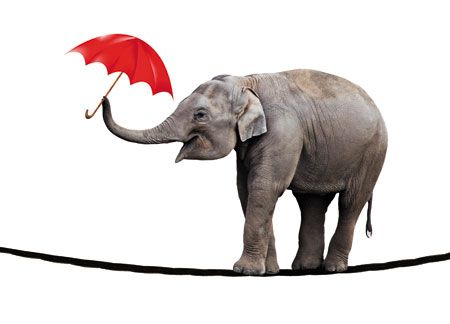Strive for balance on the high wire
Work-life balance isnt a constant state of being. Rather, its a the process of making small adjustments all the time.

Over the time I've been writing this column and speaking at symposia I've found that there are two general themes that surface again and again. The first is client experience, and the second is working to make life balance a priority. While everyone generally agrees with the need for life balance and harmony, being out of balance continues to be an accepted reality. I've realized that simply telling someone to be more balanced is like telling a pig to fly. Without tools and specific steps it just ain't gonna happen. So I've made it a priority to search for specific actions that we can take to make theory reality.
According to author, speaker and philosopher Tom Morris, PhD, of the Morris Institute, most people suffer needlessly from a complete misconception about what life balance is. Many individuals are stressed and recognize they are living unbalanced lives. But what exactly is the balance they strive for?
You may have seen the movie Man on a Wire a few years ago or the more current movie The Walk. In both films the characters make a decision to perform an impossible feat on a tight wire seemingly miles in the air. We are left asking questions like “How?” “Why?” and “What if?” From a distance the wire walker looks like he is virtually gliding along the wire, but in reality he is out of balance virtally every step as he struggles to make it appear smooth and easy.
Think about a gymnast or yoga master standing as still as ice with perfect balance-or is it? Actually these people are in constant motion, making adjustments to their position, posture and movements so fine that they're imperceptible to anyone but them.
We're all like the tightrope walker. A a little out of balance, in some way or another. There is no perfect balance and, in fact, the key to life balance is constant adjustment and correction, along with forward movement.
Like the gymnast or wire walker or yoga master, we should watch for slight shifts in balance and do something about it before we come down like a Jenga tower. Don't be afraid of being out of balance. Most of us are, most of the time. The challenge is to not get caught up in feelings of regret or remorse but to focus on fine adjustment and adaptation much like the wire walker who strives to remain in balance over time.
Personal life balance isn't constant. Sometimes you spend a little too much time at work, so change that. Shift your emphasis to time with family and friends. Not enough emphasis on work? Failing to do things you need to get done? Adjust the other way. Many people, when working hard, feel bad that they're not at home, or they worry when they're at home that they're not working as they should be. The result is that they never really experience what they're doing. They never really show up and are never invested in the moment. This is no way to live-or work.
I recently came across an article in The Huffington Post titled “5 Lessons We Can All Learn About Finding Balance From Yogis,” which I think is applicable to the veterinary profession. Here's a summary:
Breathe. I have a tattoo on my arm made up of lyrics to a Jimmy Buffett song: “Breathe in, breathe out … move on.” When you feel stressed or overwhelmed, close your eyes and breathe in and out through your nose, inhaling and exhaling to a count of four.
Be conscious. Be aware of how you “are.” How do you treat others? Do you focus on the positive?
Let go. Quit holding on to negative thoughts and influences.
Be steady. Don't listen to your internal conversations too much. Be aware of your thoughts and emotions without being self-critical and judgmental.
Step out of your comfort zone. Don't run away from a difficult challenge. Stay with it and watch yourself act with grace under tough circumstances.
In my upcoming columns we will explore steps to help you recognize how you personally deal with stress and what you can do to better make those fine adjustments that will keep you feeling balanced.
Dr. Paul is the former executive director of the Companion Animal Parasite Council and a former president of the American Animal Hospital Association. He is currently the principal of MAGPIE Veterinary Consulting. He is retired from practice and lives in Anguilla, British West Indies.